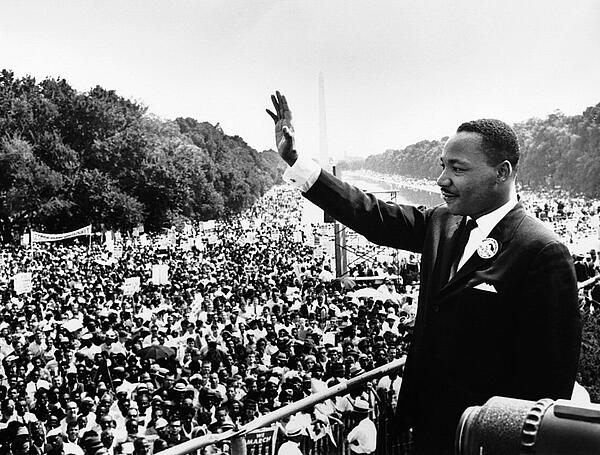Martin Luther King
Martin Luther King is the most well-known civil rights leader. Throughout his life he played an active role in fighting for the rights of African Americans, from his work during the Montgomery Bus Boycott up until his assassination in April 1968. His “I have a Dream” speech has come to epitomise his determination, ambition, and success as a leader of the Civil Rights Movement.
Born in Georgia, Atlanta, on 15 January 1929, Martin Luther King Jr grew up with the teachings of church. His father and grandfather were Baptist preachers, bestowing on King a desire to fight for civil rights from an early age. King was one of 11 black students at the Crozer Theological Seminary in Pennsylvania where he learned about forms of non-violent protest used by Gandhi. King graduated with a deep interest in theology and pacifism.
King married Coretta Scott shortly after leaving Crozer and became a Baptist pastor at the Dexter Avenue Baptist Church in Montgomery, Alabama. King played a vital part in the Montgomery Bus Boycott in 1956. He was appointed the president of the Montgomery Improvement Association and advocated the use of mass nonviolent protest. This would become the model for challenging racial segregation in the South.
The authorities used an obscure law relating to boycotting to authorise King’s arrest. He was fined and intimidated, but this didn’t stop his work with the MIA. Their success came at the end of 1956, when segregation was banned in Montgomery and bus integration was introduced.

The boycott was the catalyst of the formation of the Southern Christian Leadership Conference (SCLC). Its objective was to co-ordinate local protests across the South. Under the leadership of King, the organisation promoted nonviolent protest and Christian ethics. Its motto was, "Not one hair of one head of one person should be harmed." The black churches in the South were powerful organisation, and the SNCC knew how important it was to harness the power and independence of these churches.
Students at Greensboro were inspired by King‘s book ‘Stride Towards Freedom’ - a memoir about the Montgomery bus Boycotts. Basing their demonstrations on the non-violent protest of those in Montgomery, they decided to start a student sit-in at one of the lunch counters in Woolworth’s. Martin Luther King also inspired the Freedom Rider’s use of non-violent protest to desegregate transport in the South.
King had already proven himself as an exceptional orator. He gained the support of many through his speeches and highlighted the economic power the black communities held. He tried to get communities to support businesses that supported the civil rights cause, and boycott those who did not.
King also recognised the importance of Federal Government in securing civil rights, as well as the power of the vote. The majority of black people in the South struggled to exercise their constitutional right to vote. In Mississippi, 42 per cent of the state's population was black but only two per cent registered to vote in the 1960 election. However, thanks to voter registration drives and civil rights legislation, more people registered throughout the South. In 1960, their support (70 per cent) helped Democrat J F Kennedy beat Richard Nixon by a narrow margin.
In 1963, Kennedy proposed his civil rights bill. The March on Washington, organised by King and other civil rights leaders, was hugely important in convincing Congress to support the bill. Baynard Rustin took leadership of the march.
The march on Washington proved to be a huge success. Up to 400,000 people joined the march on 28 August 1963 and listened to King’s 'I have a Dream' speech. What’s more, the speech was broadcast across the world, bringing much needed international attention to the civil rights movement.
The Civil Rights Act was eventually passed in 1964 following Kennedy’s assasination in 1962.
King then pushed for a bill that would ensure every black citizen had the right to vote, which led to the 1965 Voting Rights Act.
In the last years of his life, King increasingly turned his attention to social issues, including poverty and economic inequality. He became more radical and was accused of being a communist by the FBI. He also strongly opposed the Vietnam War.
King was constantly threatened by those who opposed his work. In the South, the KKK did their best to undercut his influence. Even the FBI worked to undermine King’s influence. Under J Edgar Hoover’s leadership, the FBI bugged King’s hotel rooms and released recordings as evidence of his extramarital affairs in an attempt to damage his reputation.
On 4 April 1968, during a trip to Memphis, Martin Luther King was assassinated as he stood on the balcony of a motel. The world responded with horror and race riots erupted across the US. James Earl Ray was found guilty of King's murder in March 1969,and sentenced to 99 years in prison.
See also: Martin Luther King Quotes
MLA Citation/Reference
"Martin Luther King". HistoryLearning.com. 2026. Web.
Key facts
| Name: | Martin Luther King Jr |
| Birth Date: | 15 January 1929, Atlanta, Georgia |
| Death: | 4 April 1968, Memphis, Tennessee |
| Cause of death: | Assassination |
| Occupation: | Clergyman, civil rights activist |
| Known for: | Leader of SCLC, advocate for non-violent protest, organiser of March on Washington |
